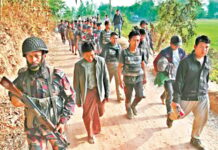The Appellate Division will deliver today its verdict in the appeal of war crimes death row inmate Salauddin Quader Chowdhury.
On Tuesday, the apex court set the matter as the number one item on the cause list for today.
The apex court posted the cause list on its website.
On July 7, after hearing both the sides, a four-judge bench chaired by Chief Justice SK Sinha set the schedule.
The bench included Justice Nazmun Ara Sultana, Justice Syed Mahmud Hossain and Justice Hasan Foez Siddique.
On October 1, 2013, the International Crimes Tribunal-1 sentenced Salauddin to death on four war crimes charges and jailed him for various terms on five charges.
He was acquitted of 14 other charges.
He was handed prison terms from five to 20 years on five war crimes charges.
Salaudin received death sentences for killing philanthropist and Kundeshwari Owsadhalay founder Natun Chandra Singha at Maddhaya Gohira on the morning of April 13, 1971, Chandra Kumar Paul and 49 others at Unsattur Para on the afternoon of April 13, Nepal Chandra Dhar, Monendra Lal Dhar, Opendra Lal Dhar and Anil Baran Dhar at Banikpara in Sultanganj in the early hours of April 13, the founder of the Chittagong chapter of Awami League Sheikh Mozaffor Ahmed and his son Sheikh Alamgir at Khagrachari on the morning of April 17, 1971.
Salauddin was with the Pakistani occupation Army troops when the killings took place, said the verdict of the ICT-1.
About the charge of killing Natun Chandra Singha, the Appellate Division had commented that documentary evidence shows that the victim’s son had filed a criminal case against Salauddin with the Rawjan police station in January 1972 accusing him of killing his father.
The filing of the case proved that Salauddin was in the country during the Liberation War, the Appellate Division said during the hearing.
If he was not present in the country the case would not have been filed, said the Appellate Division.
It said the apex court had no option but to accept the then Dainik Pakistan report of September 29, 1971 which says that Fazlul Quader Chowdhury’s son and his driver were injured in a bomb attack on September 20, 1971.
It said that the prosecution produce the report as evidence.
For his anti-liberation role, the tribunal had said, on September 20, 1971, freedom fighters charged grenade on Salauddin Quader Chowdhury causing injuries on his person.
Salauddin later left the country for his misdeeds and he came back to Bangladesh in 1974. He joined politics at Chittagong and was elected Member of Parliament for five times as the candidate of different political parties, namely, Muslim League, Jatiya Party, N.D.P. and BNP between 1979 and 2008, said the tribunal.
It said that Salauddin and his father the late Fazlul Quader Chowdhury, a former Speaker of the National Assembly of Pakistan used their residence named ‘Goods Hill’ at Chittagong town as a torture centre and as a self appointed Brigadier Salauddin led operations at different places of Chittagong.
The defence counsel for Salauddin argued he was not involved in the war crimes as being a student of Punjab University he had left for the then West Pakistan on March 29, 1971 and returned to Bangladesh from London in April 1974.
They also produced a certificate issued by Punjab University to establish that Salauddin studied there when the killings took place
The defence described all the charges brought against him as false, fabricated and politically motivated.
Source: New Age










